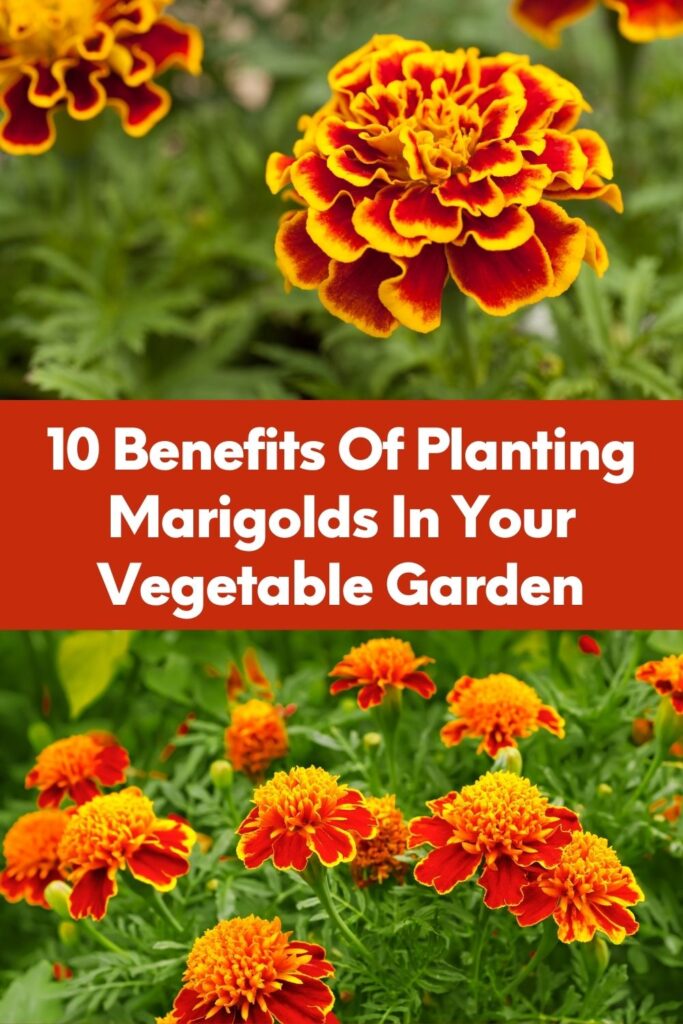Marigolds are tall flowers, growing up to nearly three feet in height. They are globe-shaped and can be either red, orange, or yellow. They represent passion, creativity, and have been associated with the legendary courageous lion.
Along with these origins, marigolds are often seen in gardens due to their remarkable properties.
Vegetable gardening is a great hobby and a perfect resource to obtain fresh, natural foods. With that being said, when you hear about growing marigold flowers in your garden, it may sound confusing.
If you are a gardener that never really thought about planting flowers in your vegetable garden before, then now would be a fantastic time to consider it.
Marigold may be a flower, but with its make-up and naturally derived elements, it is able to provide an incredible amount of benefits for your vegetable garden.
1.Attracts Bees And Other Pollinators
Planting marigolds in the vegetable garden attracts bees and pollinators. The bright blooms of this flower make a tempting treat for honeybees, butterflies, birds- even humans!
If you want to attract these beneficial creatures while also enjoying beautiful greenery from your own kitchen window; plant single-bloomed varieties near vegetables where they can easily reach their favorite snack: pollen!
2. Repel Some Pests
Another benefit of planting marigolds is that many gardeners swear marigolds repel many pests when planted in a vegetable garden.
We know that the claims that marigolds repel deer or rabbits are wrong, but evidence shows marigolds do repel some pests, such as cabbage moths and Mexican bean beetles.
One of the reasons why marigolds might be so helpful in repelling pests is their strong scent. Chances are, it masks the smell of your vegetable plants, causing pests and predators to head the other way.
3. Protect Tomatoes
Marigolds and tomato plants are best friends, so planting them near tomatoes adds an essential protection layer.
It’s shown to repel nematodes, slugs, tomato hornworms, and other pests that love to munch on tomatoes.
4. Ward Off Harmful Nematodes
Thousands of nematode species exist, but a few are incredibly damaging to garden crops. Fighting nematodes is difficult, if not impossible, so the best choice is to use them as a companion plant to stop nematodes from invading the soil.
It’s said that marigolds help out neighboring plants by killing nematodes. However, there is a lot of confusion around this topic, and not everyone believes it works.
Marigolds produce a compound in their roots that are used in nematicides. That being said, a wide range of nematodes exist, and it’s hard to determine your particular problem.
The good thing is that, whether or not they genuinely ward of nematodes, adding marigolds won’t harm your garden, so give it a whirl anyway.
5. Companion Plants For Many Vegetables
Marigolds are an excellent addition to most vegetable gardens because they’re a companion plant to bush beans, potatoes, broccoli, squash, eggplant, and kale.
For many other plants, marigolds are considered a neutral companion, which means they’re neither harmful nor beneficial so that they can be planted in many garden areas.
6. Add Color And Beauty
Everyone appreciates a bit of color and beauty. If you’ve never grown flowers with your vegetable plants, you’re missing out.
They add pops of color and bring beauty to a garden that’s typically all green. They’ll bring smiles to your face each time you walk into your garden.
7. Low Maintenance Flower
Can you think of a flower that’s easier to grow than marigolds? Marigolds are so easy to grow and grow well in a range of soil types and conditions.
As long as they have plenty of sunlight, they continue to grow and thrive with little to no help from you.
8. Marigolds Are Edible
Yes, you read that correctly. Most people have no idea that these easy to grow flowers are edible as well. That means they’re more than a companion plant; they’re an edible crop as well.
Add marigold petals to salads, use them as a decoration on cakes or cupcakes, or make a vinaigrette featuring marigold petals. You might be surprised by all the ways that marigolds can be used in the kitchen.
9. Act As An Effective Trap Crop
Some gardeners say that marigolds might be a useful trap crop for specific pests. This means that they lure pests to them, keeping them away from valuable crops.
An example is slugs, which love marigolds. Planting many marigolds around garden beds that contain other plants that slugs love can save them from certain death.
10. Medicinal Properties
Calendula and marigolds belong to the same family, so many of the same properties that calendula has, marigolds do as well.
Marigolds help with skin conditions, rashes, minor wounds, bedsores, eczema, and varicose veins. They also aid in treating sores, inflammation, and itchiness.
 10 Benefits Of Planting Marigolds In Your Vegetable Garden
10 Benefits Of Planting Marigolds In Your Vegetable Garden














